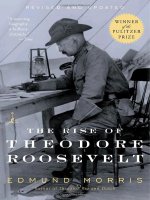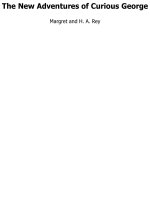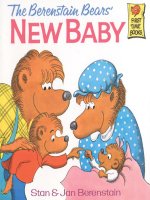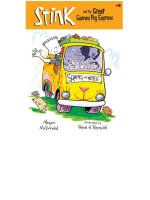A a milne WINNIE THE POOH 01 the house at pooh corner (v5 0)
Bạn đang xem bản rút gọn của tài liệu. Xem và tải ngay bản đầy đủ của tài liệu tại đây (3.07 MB, 101 trang )
THE HOUS E AT P OOH CORNER
The House At Pooh Corner
A. A. MILNE
DECORATIONS BY
Ernest H. Shepard
Dutton Children’s Books
.
AN IM PRINT OF PENGUIN GROUP [USA] INC
Dutton Children’s Books
A DIVISION OF PENGUIN YOUNG READERS GROUP
Published by the Penguin Group
Penguin Group (USA) Inc., 375 Hudson Street, New York, New York 10014, USA Penguin Group
(Canada), 90 Eglinton Avenue East, Suite 700, Toronto, Ontario, M4P 2Y3 Canada (a division of
Pearson Penguin Canada Inc.) • Penguin Books Ltd, 80 Strand, London WC2R 0RL, England Penguin
Ireland, 25 St Stephen’s Green, Dublin 2, Ireland (a division of Penguin Books Ltd) • Penguin Group
(Australia), 250 Camberwell Road, Camberwell, Victoria 3124, Australia (a division of Pearson
Australia Group Pty Ltd) • Penguin Books India Pvt Ltd, 11 Community Centre, Panchsheel Park,
New Delhi - 110 017, India • Penguin Group (NZ), 67 Apollo Drive, Rosedale, North Shore 0632,
New Zealand (a division of Pearson New Zealand Ltd.) • Penguin Books (South Africa) (Pty) Ltd, 24
Sturdee Avenue, Rosebank, Johannesburg 2196, South Africa • Penguin Books Ltd, Registered
Offices: 80 Strand, London WC2R 0RL, England
This book is a work of fiction. Names, characters, places, and incidents are either the product of the
author’s imagination or are used fictitiously, and any resemblance to actual persons, living or dead,
business establishments, events, or locales is entirely coincidental.
This presentation copyright © 2009 by The Trustees of the Pooh Properties
Coloring of the illustrations copyright © 1992 by Dutton Children’s Books The House At Pooh
Corner copyright © 1928 by E. P. Dutton; copyright renewal, 1956, by A. A. Milne
All rights reserved. No part of this publication may be reproduced or transmitted in any form or by
any means, electronic or mechanical, including photocopying, recording, or any information storage
and retrieval system now known or to be invented, without permission in writing from the publisher,
except by a reviewer who wishes to quote brief passages in connection with a review written for
inclusion in a magazine, newspaper, or broadcast.
The publisher does not have any control over and does not assume any responsibility for author or
third-party websites or their content.
.
CIP DATA AVAILABLE
Published in the United States by Dutton Children’s Books,
a division of Penguin Young Readers Group
345 Hudson Street, New York, New York 10014
www.penguin.com/youngreaders
ISBN: 1-101-15894-8
You gave me Christopher Robin, and then
You breathed new life in Pooh.
Whatever of each has left my pen
Goes homing back to you.
My book is ready, and comes to greet
The mother it longs to see—
It would be my present to you, my sweet,
If it weren’t your gift to me.
Contradiction
AN INTRODUCTION is to introduce people, but Christopher Robin and his friends, who have already been
introduced to you, are now going to say Good-bye. So this is the opposite. When we asked Pooh what
the opposite of an Introduction was, he said “The what of a what?” which didn’t help us as much as
we had hoped, but luckily Owl kept his head and told us that the opposite of an Introduction, my dear
Pooh, was a Contradiction; and, as he is very good at long words, I am sure that that’s what it is.
Why we are having a Contradiction is because last week when Christopher Robin said to me,
“What about that story you were going to tell me about what happened to Pooh when—” I happened to
say very quickly, “What about nine times a hundred and seven?” And when we had done that one, we
had one about cows going through a gate at two a minute, and there are three hundred in the field, so
how many are left after an hour and a half? We find these very exciting, and when we have been
excited quite enough, we curl up and go to sleep…and Pooh, sitting wakeful a little longer on his
chair by our pillow, thinks Grand Thoughts to himself about Nothing, until he, too, closes his eyes and
nods his head, and follows us on tip-toe into the Forest. There, still, we have magic adventures, more
wonderful than any I have told you about; but now, when we wake up in the morning, they are gone
before we can catch hold of them. How did the last one begin? “One day when Pooh was walking in
the Forest, there were one hundred and seven cows on a gate….” No, you see, we have lost it. It was
the best, I think. Well, here are some of the other ones, all that we shall remember now. But, of
course, it isn’t really Good-bye, because the Forest will always be there…and anybody who is
Friendly with Bears can find it.
A. A. M .
Contents
CHAPTER ONE
IN WHICH A House Is Built at Pooh Corner for Eeyore
CHAPTER TWO
IN WHICH Tigger Comes to the Forest and Has Breakfast
CHAPTER THREE
IN WHICH A Search Is Organdized, and Piglet Nearly Meets the Heffalump Again
CHAPTER FOUR
IN WHICH It Is Shown That Tiggers Don’t Climb Trees
CHAPTER FIVE
IN WHICH Rabbit Has a Busy Day, and We Learn What Christopher Robin Does in the
Mornings
CHAPTER SIX
IN WHICH Pooh Invents a New Game and Eeyore Joins In
CHAPTER SEVEN
IN WHICH Tigger Is Unbounced
CHAPTER EIGHT
IN WHICH Piglet Does a Very Grand Thing
CHAPTER NINE
IN WHICH Eeyore Finds the Wolery and Owl Moves Into It
CHAPTER TEN
IN WHICH Christopher Robin and Pooh Come to an Enchanted Place, and We Leave
Them There
THE HOUS E AT P OOH CORNER
Chapter One
IN WHICH
A House Is Built at Pooh Corner for Eeyore
ONE DAY when Pooh Bear had nothing else to do, he thought he would do something, so he went round
to Piglet’s house to see what Piglet was doing. It was still snowing as he stumped over the white
forest track, and he expected to find Piglet warming his toes in front of his fire, but to his surprise he
saw that the door was open, and the more he looked inside the more Piglet wasn’t there.
“He’s out,” said Pooh sadly. “That’s what it is. He’s not in. I shall have to go a fast Thinking
Walk by myself. Bother!”
But first he thought that he would knock very loudly just to make quite sure…and while he
waited for Piglet not to answer, he jumped up and down to keep warm, and a hum came suddenly into
his head, which seemed to him a Good Hum, such as is Hummed Hopefully to Others.
The more it snows
(Tiddely pom),
The more it goes
(Tiddely pom),
The more it goes
(Tiddely pom),
On snowing.
And nobody knows
(Tiddely pom),
How cold my toes
(Tiddely pom),
How cold my toes
(Tiddely pom),
Are growing.
“So what I’ll do,” said Pooh, “is I’ll do this. I’ll just go home first and see what the time is, and
perhaps I’ll put a muffler round my neck, and then I’ll go and see Eeyore and sing it to him.”
He hurried back to his own house; and his mind was so busy on the way with the hum that he was
getting ready for Eeyore that, when he suddenly saw Piglet sitting in his best arm-chair, he could only
stand there rubbing his head and wondering whose house he was in.
“Hallo, Piglet,” he said. “I thought you were out.”
“No,” said Piglet, “it’s you who were out, Pooh.”
“So it was,” said Pooh. “I knew one of us was.”
He looked up at his clock, which had stopped at five minutes to eleven some weeks ago.
“Nearly eleven o’clock,” said Pooh happily. “You’re just in time for a little smackerel of
something,” and he put his head into the cupboard. “And then we’ll go out, Piglet, and sing my song to
Eeyore.”
“Which song, Pooh?”
“The one we’re going to sing to Eeyore,” explained Pooh.
The clock was still saying five minutes to eleven when Pooh and Piglet set out on their way half
an hour later. The wind had dropped, and the snow, tired of rushing round in circles trying to catch
itself up, now fluttered gently down until it found a place on which to rest, and sometimes the place
was Pooh’s nose and sometimes it wasn’t, and in a little while Piglet was wearing a white muffler
round his neck and feeling more snowy behind the ears than he had ever felt before.
“Pooh,” he said at last, and a little timidly, because he didn’t want Pooh to think he was Giving
In, “I was just wondering. How would it be if we went home now and practised your song, and then
sang it to Eeyore to-morrow—or—or the next day, when we happen to see him.”
“That’s a very good idea, Piglet,” said Pooh. “We’ll practise it now as we go along. But it’s no
good going home to practise it, because it’s a special Outdoor Song which Has To Be Sung In The
Snow.”
“Are you sure?” asked Piglet anxiously.
“Well, you’ll see, Piglet, when you listen. Because this is how it begins. The more it snows,
tiddely pom—”
“Tiddely what?” said Piglet.
“Pom,” said Pooh. “I put that in to make it more hummy. The more it goes, tiddely pom, the
more—”
“Didn’t you say snows?”
“Yes, but that was before.”
“Before the tiddely pom?”
“It was a different tiddely pom,” said Pooh, feeling rather muddled now. “I’ll sing it to you
properly and then you’ll see.”
So he sang it again.
The more it
SNOWS-tiddely-pom,
The more it
GOES-tiddely-pom
The more it
GOES-tiddely-pom
On
Snowing.
And nobody
KNOWS-tiddely-pom,
How cold my
TOES-tiddely-pom
How cold my
TOES-tiddely-pom
Are
Growing.
He sang it like that, which is much the best way of singing it, and when he had finished, he
waited for Piglet to say that, of all the Outdoor Hums for Snowy Weather he had ever heard, this was
the best. And, after thinking the matter out carefully, Piglet said:
“Pooh,” he said solemnly, “it isn’t the toes so much as the ears.”
By this time they were getting near Eeyore’s Gloomy Place, which was where he lived, and as it
was still very snowy behind Piglet’s ears, and he was getting tired of it, they turned into a little pine
wood, and sat down on the gate which led into it. They were out of the snow now, but it was very
cold, and to keep themselves warm they sang Pooh’s song right through six times, Piglet doing the
tiddely-poms and Pooh doing the rest of it, and both of them thumping on the top of the gate with
pieces of stick at the proper places. And in a little while they felt much warmer, and were able to talk
again.
“I’ve been thinking,” said Pooh, “and what I’ve been thinking is this. I’ve been thinking about
Eeyore.”
“What about Eeyore?”
“Well, poor Eeyore has nowhere to live.”
“Nor he has,” said Piglet.
“You have a house, Piglet, and I have a house, and they are very good houses. And Christopher
Robin has a house, and Owl and Kanga and Rabbit have houses, and even Rabbit’s friends and
relations have houses or somethings, but poor Eeyore has nothing. So what I’ve been thinking is: Let’s
build him a house.”
“That,” said Piglet, “is a Grand Idea. Where shall we build it?”
“We will build it here,” said Pooh, “just by this wood, out of the wind, because this is where I
thought of it. And we will call this Pooh Corner. And we will build an Eeyore House with sticks at
Pooh Corner for Eeyore.”
“There was a heap of sticks on the other side of the wood,” said Piglet. “I saw them. Lots and
lots. All piled up.”
“Thank you, Piglet,” said Pooh. “What you have just said will be a Great Help to us, and
because of it I could call this place Poohanpiglet Corner if Pooh Corner didn’t sound better, which it
does, being smaller and more like a corner. Come along.”
So they got down off the gate and went around to the other side of the wood to fetch the sticks.
Christopher Robin had spent the morning indoors going to Africa and back, and he had just got
off the boat and was wondering what it was like outside, when who should come knocking at the door
but Eeyore.
“Hallo, Eeyore,” said Christopher Robin, as he opened the door and came out. “How are you?”
“It’s snowing still,” said Eeyore gloomily.
“So it is.”
“And freezing.”
“Is it?”
“Yes,” said Eeyore. “However,” he said, brightening up a little, “we haven’t had an earthquake
lately.”
“What’s the matter, Eeyore?”
“Nothing, Christopher Robin. Nothing important. I suppose you haven’t seen a house or whatnot
anywhere about?”
“What sort of a house?”
“Just a house.”
“Who lives there?”
“I do. At least I thought I did. But I suppose I don’t. After all, we can’t all have houses.”
“But Eeyore, I didn’t know. I always thought—”
“I don’t know how it is, Christopher Robin, but what with all this snow and one thing and
another, not to mention icicles and such-like, it isn’t so Hot in my field about three o’clock in the
morning as some people think it is. It isn’t Close, if you know what I mean—not so as to be
uncomfortable. It isn’t Stuffy. In fact, Christopher Robin,” he went on in a loud whisper, “quitebetween-ourselves-and-don’t-tell-anybody, it’s Cold.”
“Oh, Eeyore!”
“And I said to myself: The others will be sorry if I’m getting myself all cold. They haven’t got
Brains, any of them, only grey fluff that’s blown into their heads by mistake, and they don’t Think, but
if it goes on snowing for another six weeks or so, one of them will begin to say to himself: ‘Eeyore
can’t be so very much too Hot about three o’clock in the morning.’ And then it will Get About. And
they’ll be Sorry.”
“Oh, Eeyore!” said Christopher Robin, feeling very sorry already.
“I don’t mean you, Christopher Robin. You’re different. So what it all comes to is that I built
myself a house down by my little wood.”
“Did you really? How exciting!”
“The really exciting part,” said Eeyore in his most melancholy voice, “is that when I left it this
morning it was there, and when I came back it wasn’t. Not at all, very natural, and it was only
Eeyore’s house. But still I just wondered.”
Christopher Robin didn’t stop to wonder. He was already back in his house, putting on his
waterproof hat, his waterproof boots and his waterproof macintosh as fast as he could.
“We’ll go and look for it at once,” he called out to Eeyore.
“Sometimes,” said Eeyore, “when people have quite finished taking a person’s house, there are
one or two bits which they don’t want and are rather glad for the person to take back, if you know
what I mean. So I thought if we just went—”
“Come on,” said Christopher Robin, and off they hurried, and in a very little time they got to the
corner of the field by the side of the pine-wood, where Eeyore’s house wasn’t any longer.
“There!” said Eeyore. “Not a stick of it left! Of course, I’ve still got all this snow to do what I
like with. One mustn’t complain.”
But Christopher Robin wasn’t listening to Eeyore, he was listening to something else.
“Can’t you hear it?” he asked.
“What is it? Somebody laughing?”
“Listen.”
They both listened…and they heard a deep gruff voice saying in a singing voice that the more it
snowed the more it went on snowing and a small high voice tiddely-pomming in between.
“It’s Pooh,” said Christopher Robin excitedly.
“Possibly,” said Eeyore.
“And Piglet!” said Christopher Robin excitedly.
“Probably,” said Eeyore. “What we want is a Trained Bloodhound.”
The words of the song changed suddenly.
“We’ve finished our HOUSE!” sang the gruff voice.
“Tiddely-pom!” sang the squeaky one.
“It’s a beautiful HOUSE….”
“Tiddely-pom….”
“I wish it were MINE….”
“Tiddely-pom….”
“Pooh!” shouted Christopher Robin….
The singers on the gate stopped suddenly.
“It’s Christopher Robin!” said Pooh eagerly.
“He’s round by the place where we got all those sticks from,” said Piglet.
“Come on,” said Pooh.
They climbed down their gate and hurried round the corner of the wood, Pooh making
welcoming noises all the way.
“Why, here is Eeyore,” said Pooh, when he had finished hugging Christopher Robin, and he
nudged Piglet, and Piglet nudged him, and they thought to themselves what a lovely surprise they had
got ready.
“Hallo, Eeyore.”
“Same to you, Pooh Bear, and twice on Thursdays,” said Eeyore gloomily.
Before Pooh could say: “Why Thursdays?” Christopher Robin began to explain the sad story of
Eeyore’s Lost House. And Pooh and Piglet listened, and their eyes seemed to get bigger and bigger.
“Where did you say it was?” asked Pooh.
“Just here,” said Eeyore.
“Made of sticks?”
“Yes.”
“Oh!” said Piglet.
“What?” said Eeyore.
“I just said ‘Oh!’” said Piglet nervously. And so as to seem quite at ease he hummed Tiddelypom once or twice in a what-shall-we-do-now kind of way.
“You’re sure it was a house?” said Pooh. “I mean, you’re sure the house was just here?”
“Of course I am,” said Eeyore. And he murmured to himself, “No brain at all some of them.”
“Why, what’s the matter, Pooh?” asked Christopher Robin.
“Well,” said Pooh…. “The fact is,” said Pooh…. “Well, the fact is,” said Pooh…. “You see,”
said Pooh…. “It’s like this,” said Pooh, and something seemed to tell him that he wasn’t explaining
very well, and he nudged Piglet again.
“It’s like this,” said Piglet quickly…. “Only warmer,” he added after deep thought.
“What’s warmer?”
“The other side of the wood, where Eeyore’s house is.”
“My house?” said Eeyore. “My house was here.”
“No,” said Piglet firmly. “The other side of the wood.”
“Because of being warmer,” said Pooh.
“But I ought to know—”
“Come and look,” said Piglet simply, and he led the way.
“There wouldn’t be two houses,” said Pooh. “Not so close together.”
They came round the corner, and there was Eeyore’s house, looking as comfy as anything.
“There you are,” said Piglet.
“Inside as well as outside,” said Pooh proudly.
Eeyore went inside…and came out again.
“It’s a remarkable thing,” he said. “It is my house, and I built it where I said I did, so the wind
must have blown it here. And the wind blew it right over the wood, and blew it down here, and here
it is as good as ever. In fact, better in places.”
“Much better,” said Pooh and Piglet together.
“It just shows what can be done by taking a little trouble,” said Eeyore. “Do you see, Pooh? Do
you see, Piglet? Brains first and then Hard Work. Look at it! That’s the way to build a house,” said
Eeyore proudly.
So they left him in it; and Christopher Robin went back to lunch with his friends Pooh and Piglet,
and on the way they told him of the Awful Mistake they had made. And when he had finished
laughing, they all sang the Outdoor Song for Snowy Weather the rest of the way home, Piglet, who
was still not quite sure of his voice, putting in the tiddely-poms again.
“And I know it seems easy,” said Piglet to himself, “but it isn’t everyone who could do it.”
Chapter Two
IN WHICH
Tigger Comes to the Forest and Has Breakfast
WINNIE-THE-POOH woke up suddenly in the middle of the night and listened. Then he got out of bed, and
lit his candle, and stumped across the room to see if anybody was trying to get into his honeycupboard, and they weren’t, so he stumped back again, blew out his candle, and got into bed. Then he
heard the noise again.
“Is that you, Piglet?” he said.
But it wasn’t.
“Come in, Christopher Robin,” he said.
But Christopher Robin didn’t.
“Tell me about it tomorrow, Eeyore,” said Pooh sleepily.
But the noise went on.
“Worraworraworraworraworra,” said Whatever-it-was, and Pooh found that he wasn’t asleep
after all.
“What can it be?” he thought. “There are lots of noises in the Forest, but this is a different one. It
isn’t a growl, and it isn’t a purr, and it isn’t a bark, and it isn’t the noise-you-make-before-beginninga-piece-of-poetry, but it’s a noise of some kind, made by a strange animal. And he’s making it outside
my door. So I shall get up and ask him not to do it.”
He got out of bed and opened his front door.
“Hallo!” said Pooh, in case there was anything outside.
“Hallo!” said Whatever-it-was.
“Oh!” said Pooh. “Hallo!”
“Hallo!”
“Oh, there you are!” said Pooh. “Hallo!”
“Hallo!” said the Strange Animal, wondering how long this was going on.
Pooh was just going to say “Hallo!” for the fourth time when he thought that he wouldn’t so he
said: “Who is it?” instead.
“Me,” said a voice.
“Oh!” said Pooh. “Well, come here.”
So Whatever-it-was came here, and in the light of the candle he and Pooh looked at each other.
“I’m Pooh,” said Pooh.
“I’m Tigger,” said Tigger.
“Oh!” said Pooh, for he had never seen an animal like this before. “Does Christopher Robin
know about you?”
“Of course he does,” said Tigger.
“Well,” said Pooh, “it’s the middle of the night, which is a good time for going to sleep. And
tomorrow morning we’ll have some honey for breakfast. Do Tiggers like honey?”
“They like everything,” said Tigger cheerfully.
“Then if they like going to sleep on the floor, I’ll go back to bed,” said Pooh, “and we’ll do
things in the morning. Good night.” And he got back into bed and went fast asleep.
When he awoke in the morning, the first thing he saw was Tigger, sitting in front of the glass and
looking at himself.
“Hallo!” said Pooh.
“Hallo!” said Tigger. “I’ve found somebody just like me. I thought I was the only one of them.”
Pooh got out of bed, and began to explain what a looking-glass was, but just as he was getting to
the interesting part, Tigger said:
“Excuse me a moment, but there’s something climbing up your table,” and with one loud
Worraworraworraworraworra he jumped at the end of the tablecloth, pulled it to the ground,
wrapped himself up in it three times, rolled to the other end of the room, and, after a terrible struggle,
got his head into the daylight again, and said cheerfully: “Have I won?”
“That’s my tablecloth,” said Pooh, as he began to unwind Tigger.
“I wondered what it was,” said Tigger.
“It goes on the table and you put things on it.”
“Then why did it try to bite me when I wasn’t looking?”
“I don’t think it did,” said Pooh.
“It tried,” said Tigger, “but I was too quick for it.”
Pooh put the cloth back on the table, and he put a large honey-pot on the cloth, and they sat down
to breakfast. And as soon as they sat down, Tigger took a large mouthful of honey…and he looked up
at the ceiling with his head on one side, and made exploring noises with his tongue and considering
noises, and what-have-we-got-here noises…and then he said in a very decided voice:
“Tiggers don’t like honey.”
“Oh!” said Pooh, and tried to make it sound Sad and Regretful. “I thought they liked everything.”
“Everything except honey,” said Tigger.
Pooh felt rather pleased about this, and said that, as soon as he had finished his own breakfast,
he would take Tigger round to Piglet’s house, and Tigger could try some of Piglet’s haycorns.
“Thank you, Pooh,” said Tigger, “because haycorns is really what Tiggers like best.”
So after breakfast they went round to see Piglet, and Pooh explained as they went that Piglet was
a Very Small Animal who didn’t like bouncing, and asked Tigger not to be too Bouncy just at first.
And Tigger, who had been hiding behind trees and jumping out on Pooh’s shadow when it wasn’t
looking, said that Tiggers were only bouncy before breakfast, and that as soon as they had had a few
haycorns they became Quiet and Refined. So by and by they knocked at the door of Piglet’s house.
“Hallo, Pooh,” said Piglet.
“Hallo, Piglet. This is Tigger.”
“Oh, is it?” said Piglet, and he edged round to the other side of the table. “I thought Tiggers were
smaller than that.”
“Not the big ones,” said Tigger.
“They like haycorns,” said Pooh, “so that’s what we’ve come for, because poor Tigger hasn’t
had any breakfast yet.”
Piglet pushed the bowl of haycorns towards Tigger, and said: “Help yourself,” and then he got
close up to Pooh and felt much braver, and said, “So you’re Tigger? Well, well!” in a careless sort of
voice. But Tigger said nothing because his mouth was full of haycorns….
After a long munching noise he said:
“Ee-ers o i a-ors.”
And when Pooh and Piglet said “What?” he said
“Skoos ee,” and went outside for a moment.
When he came back he said firmly:
“Tiggers don’t like haycorns.”
“But you said they liked everything except honey,” said Pooh.
“Everything except honey and haycorns,” explained Tigger.
When he heard this Pooh said, “Oh, I see!” and Piglet, who was rather glad that Tiggers didn’t
like haycorns, said, “What about thistles?”
“Thistles,” said Tigger, “is what Tiggers like best.” “Then let’s go along and see Eeyore,” said
Piglet.
So the three of them went; and after they had walked and walked and walked, they came to the
part of the Forest where Eeyore was.
“Hallo, Eeyore!” said Pooh. “This is Tigger.”
“What is?” said Eeyore.
“This,” explained Pooh and Piglet together, and Tigger smiled his happiest smile and said
nothing.
Eeyore walked all round Tigger one way, and then turned and walked all round him the other
way.
“What did you say it was?” he asked.
“Tigger.”
“Ah!” said Eeyore.
“He’s just come,” explained Piglet.
“Ah!” said Eeyore again.
He thought for a long time and then said:
“When is he going?”
Pooh explained to Eeyore that Tigger was a great friend of Christopher Robin’s, who had come
to stay in the Forest, and Piglet explained to Tigger that he mustn’t mind what Eeyore said because he
was always gloomy; and Eeyore explained to Piglet that, on the contrary, he was feeling particularly
cheerful this morning; and Tigger explained to anybody who was listening that he hadn’t had any
breakfast yet.
“I knew there was something,” said Pooh. “Tiggers always eat thistles, so that was why we
came to see you, Eeyore.”
“Don’t mention it, Pooh.”
“Oh, Eeyore, I didn’t mean that I didn’t want to see you—”
“Quite—quite. But your new stripy friend—naturally, he wants his breakfast. What did you say
his name was?”
“Tigger.”
“Then come this way, Tigger.”
Eeyore led the way to the most thistly-looking patch of thistles that ever was, and waved a hoof
at it.
“A little patch I was keeping for my birthday,” he said; “but, after all, what are birthdays? Here
today and gone tomorrow. Help yourself, Tigger.”
Tigger thanked him and looked a little anxiously at Pooh.
“Are these really thistles?” he whispered.
“Yes,” said Pooh.
“What Tiggers like best?”
“That’s right,” said Pooh.
“I see,” said Tigger.
So he took a large mouthful, and he gave a large crunch.
“Ow!” said Tigger.
He sat down and put his paw in his mouth.
“What’s the matter?” asked Pooh.
“Hot!” mumbled Tigger.
“Your friend,” said Eeyore, “appears to have bitten on a bee.”
Pooh’s friend stopped shaking his head to get the prickles out, and explained that Tiggers didn’t
like thistles.
“Then why bend a perfectly good one?” asked Eeyore.
“But you said,” began Pooh—“you said that Tiggers like everything except honey and haycorns.”
“And thistles,” said Tigger, who was now running round in circles with his tongue hanging out.
Pooh looked at him sadly.
“What are we going to do?” he asked Piglet.
Piglet knew the answer to that, and he said at once that they must go and see Christopher Robin.
“You’ll find him with Kanga,” said Eeyore. He came close to Pooh, and said in a loud whisper:
“Could you ask your friend to do his exercises somewhere else? I shall be having lunch directly,
and don’t want it bounced on just before I begin. A trifling matter, and fussy of me, but we all have
our little ways.”
Pooh nodded solemnly and called to Tigger.
“Come along and we’ll go and see Kanga. She’s sure to have lots of breakfast for you.”
Tigger finished his last circle and came up to Pooh and Piglet.
“Hot!” he explained with a large and friendly smile. “Come on!” and he rushed off.
Pooh and Piglet walked slowly after him. And as they walked Piglet said nothing, because he
couldn’t think of anything, and Pooh said nothing, because he was thinking of a poem. And when he
had thought of it he began:
What shall we do about
poor little Tigger?
If he never eats nothing he’ll
never get bigger.
He doesn’t like honey and haycorns
and thistles
Because of the taste and because of
the bristles.
And all the good things which an
animal likes
Have the wrong sort of swallow or
too many spikes.
“He’s quite big enough anyhow,” said Piglet.
“He isn’t really very big.”
“Well, he seems so.”
Pooh was thoughtful when he heard this, and then he murmured to himself:
But whatever his weight in pounds,
shillings, and ounces,
He always seems bigger
because of his bounces.
“And that’s the whole poem,” he said. “Do you like it, Piglet?”
“All except the shillings,” said Piglet. “I don’t think they ought to be there.”
“They wanted to come in after the pounds,” explained Pooh, “so I let them. It is the best way to
write poetry, letting things come.”
“Oh, I didn’t know,” said Piglet.
Tigger had been bouncing in front of them all this time, turning round every now and then to ask,
“Is this the way?”—and now at last they came in sight of Kanga’s house, and there was Christopher
Robin. Tigger rushed up to him.
“Oh, there you are, Tigger!” said Christopher Robin. “I knew you’d be somewhere.”
“I’ve been finding things in the Forest,” said Tigger importantly. “I’ve found a pooh and a piglet
and an eeyore, but I can’t find any breakfast.”
Pooh and Piglet came up and hugged Christopher Robin, and explained what had been
happening.
“Don’t you know what Tiggers like?” asked Pooh.
“I expect if I thought very hard I should,” said Christopher Robin, “but I thought Tigger knew.”
“I do,” said Tigger. “Everything there is in the world except honey and haycorns and—what
were those hot things called?”
“Thistles.”
“Yes, and those.”
“Oh, well then, Kanga can give you some breakfast.”
So they went into Kanga’s house, and when Roo had said “Hallo, Pooh” and “Hallo, Piglet”
once, and “Hallo, Tigger” twice, because he had never said it before and it sounded funny, they told
Kanga what they wanted, and Kanga said very kindly, “Well, look in my cupboard, Tigger dear, and
see what you’d like.” Because she knew at once that, however big Tigger seemed to be, he wanted as
much kindness as Roo.









